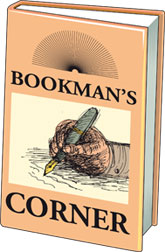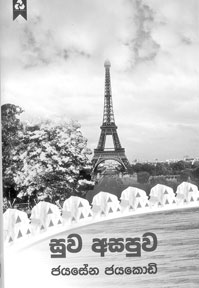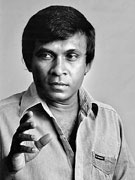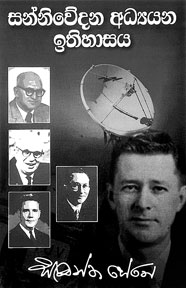|

On felicitation fiestas and felicitation volumes
Reviewed by Padma Edirisinghe
Recently I attended a felicitation ceremony, that of Siriwimal
Lakdusinghe. Sharing with him a town shot to fame through trains, I was
compelled to honour his invitation. These primitive bonds yet go on.
Anyway it evoked in me catastrophic memories of the last felicitation
ceremony I attended. No it was not the ceremony itself but the
Monitoring Committee meeting I attended. The actual celebration never
took place.
I remember the white flag fluttering atop the house caught in the
winds blowing from the Indian ocean even as I turned at the Mount
Lavinia bend from the Galle road. The preparatory meeting was to be held
at his sea side house for he was the obscure convenor and motivator for
the Felicitation Volume. But things turned very awry. That reminds me to
give this advice before going on. If you are planning to have a
felicitation of your life's doings don't wait till you are just about to
go out of the sizzling arena of life.
 Luckily this time things were different. The speeches made conveyed
the idea that Sirinimal Lakdusinghe was not behind the venture. His
students forever grateful to him for kindnesses and services done over
the years had according to these, manipulated the whole enterprise. That
again set my wretched mind activating. What a set of ungrateful citizens
we are! There are umpteen men and women who have contributed an immense
share to the nation's welfare but they enter the fearful silence of
cemeteries minus an iota of fanfare made about them. Luckily this time things were different. The speeches made conveyed
the idea that Sirinimal Lakdusinghe was not behind the venture. His
students forever grateful to him for kindnesses and services done over
the years had according to these, manipulated the whole enterprise. That
again set my wretched mind activating. What a set of ungrateful citizens
we are! There are umpteen men and women who have contributed an immense
share to the nation's welfare but they enter the fearful silence of
cemeteries minus an iota of fanfare made about them.
In one way that ingratitude has a positive aspect when one goes to
visualise the tremendous hustle and bustle that could result if all the
service-doers of the country down the ages are reciprocated with similar
gratitude. Pardon me, but I just cannot prevent my wandering mind
entertaining funny irrelevant thoughts, like this though I have nothing
against Lakdusinghe.
In fact I have all the admiration for him. As he rose in position and
power in varied capacities, he never forsook his tangled roots in this
far outpost of Veyangoda that burgeoned into prominence only with the
Yakada Yakas ...Lakdusinghe may have got the Museum Auditorium built in
his capacity as Director thereby changing the sky line of the mega city.
He may have even performed the stupendous archaeological feat of
"bonding Siva and Parvathi", the estranged couple as Prof. Suraweera put
it so wittily but the trains chug - chugging along the Kandy bound rail
route remained and remains up to now his only mode of conveyance.
Not for him the sleek limousines that drove former museum directors
mostly resident in the precincts of Colombo 7. Inside the conveyances
mostly carrying the proletariat he would sit comfortably regaling random
audiences cum train travelers with varied topics that caught his fancy.
..That is the Man I liked most. The ivory tower of the bourgeois or
aristocratic academic and he were poles apart. A product of Veyangoda
central college he contributed to realise the wish of the great
Kannangara to turn bright lads and lasses from our villages into
luminaries in the academic world.
Had the father of free education re-incarnated walked in through the
doors of the Museum Auditorium that day when the felicitation was being
held and speeches made he would have beamed with sheer joy. In that hot
sizzling afternoon another good thing actually happened. All the
speeches were short. Lakdusinghe's speech spiced with amusing comments
on his spouse's dedication to his achievements was the shortest. And he
was certainly cute when he said that he would now sit down since if he
spoke further he could ruin (savuttu) both the ceremony and the public
image of him.
That was much better than going on to blow his own bugle which
however, was being blown by others for him in adequate proportions. But
yet as I listened to these speeches I yearned for the Sanskrit slokas
and their deep sonorous elucidations delivered by Indian scholars at
conferences in the sub-continent. There was something to take home
there.
President Premadasa is accused of many bad traits including exposing
himself to be killed on the highway but he had a very good habit, that
of getting up at 3 o clock in the pre-dawn hours to read books to sieve
out quotations that could embellish his speeches intellectually. He
cared about his audience and wanted to deliver something to be carried
home, mostly by those not blessed enough like him to have access to
books and information.
Now I myself having made a sorry mess of many things under the topic,
will come into the area of the Felicitation Volume. I may be naive but
my acquaintance with felicitation volumes had made me conclude that they
should mainly contain facets of the person felicitated. But here was
something different and very significant. (Review of the book is done on
invitation) The editors, Prishantha Gunewardena, Gamini Adikari and
R.A.E. Coningham have done a marvellous job of it, that could make any
library proud to own it,
The contents come under seven categories
1. Ideology, planning strategy and State modeling
2. Human past, faunal remains and cultural process
3. Knowledge, library and technology
4. Theory, practice and material symbols
5. Ecology, nature and landscape pattern
6. Cultural resources, indigenous voices and modernisation
7. Trade, monetary system and military
If that categorization does not adequately mirror its intensity here
I produce some topics from the sections.
Sigiriya by Senaka Bandaranayake
Searching for Kapilavasthu by Coningham ....
The Rohana Mahamaga (South highway in ancient Lanka)by
Vidanapathirana
History in the Indus Valley by Mark Manuel
The First ever International Assembly in recorded history by A.V.
Suraweera
VOC missionary activity in the Dutch period by Buddini Wijesooriya
Buddhist theory and practice of throne worship by Chandra
Wicremagamage
Preservation of manuscripts in Asia by Agrawal
The study and writing of military history in Lanka by K. Wijetunga
These topics have been randomly picked and out of the 44 topics
listed, there could be many that supersede these in quality, research
value and intensity. Yet the 443- paged book of large proportions
profusely
illustrated and put out by Neptune Publications could serve one even
a lifetime reading.
Some chapters like Chapter 2 seem to have missed proof reading.
Felicitation fiestas that spawn such intensive literature are never
redundant but to achieve that one needs a loyal parivara or retinue and
Sirinimal Laddusinghe has certainly been lucky enough to be trailed by
such a parivara.
Puvakbadilla's adventure
Puvakbadillage Vikramaya
Author: Lesley B. Sirimanne
An author publication
Reviewed by R. S. Karunaratne
 Telling a story may seem easier than writing one. However, writing a
story has at least two advantages. Firstly, the author does not need an
immediate audience. Secondly, he can polish and improve his story as
much as he likes. Telling a story may seem easier than writing one. However, writing a
story has at least two advantages. Firstly, the author does not need an
immediate audience. Secondly, he can polish and improve his story as
much as he likes.
As children we have heard many interesting folk tales about
Mahadenamutta and his pupils. As the practice of story telling declined
over the years, we have to encourage children to read good stories. Most
of the popular stories for children are based on folk tales.
The author has probably created a story out of the folk tales
concerning Mahadenamutta. I use the word 'probably' because I have not
heard such a story in which Mahadenamutta delegates his powers to a
pupil. Anyway, the novelty of the plot will compel children to read the
book.
Here is a story about Puvakbadilla who happens to be the most senior
pupil of Mahadenamutta. He seems to have mastered the art of solving
problems from his master.
By making Puvakbadilla the protagonist of his story, the author has
created a sharp and central impression on the reader. The departure from
the normal practice of making Mahadenamutta the protagonist has been
successful.
The heart of a good story is conflict or struggle, Puvakbadilla is
called upon to find a solution to a conflict between a group of
villagers and a ferocious animal. At first, the innocent villagers seek
the counsel of Mahadenamutta.
However, realising the gravity of the problem, Mahadenamutta orders
his most senior pupil - Puvakbadilla - to visit the village and find a
solution.
From this point onwards the author builds suspense and makes us eager
to read the story. The suspense is built so well that the reader will
want to know what will happen next.
The little itself excites the interest of young readers. It has a
direct bearing on the story that follows. The short title is very
specific but it does not reveal the ending.
The opening lines of the story give us some idea of the narrative
that is to follow. The author seems to know that it is important to
catch the reader's attention right at the beginning. Even the ending of
the story comes quickly once the climax has been reached.
I am sure that "Puvakbadillage Vikramaya" will have an impact on
children who read the book. The author's long years of experience as a
writer of children's books is evident in his simple language and the
presentation of the book.
Kathryn Bigelow makes history as first woman to win best director
Oscar
Kathryn Bigelow became the first woman in history to win theBest
Director Award at the Oscars.
Her low-budget Iraq war film, The Hurt Locker, about a bomb disposal
team, was the big winner at the ceremony. It took six academy awards,
including those for best picture and best original screenplay.
The Hurt Locker triumphed over the 3D blockbuster Avatar, directed by
Bigelow's former husband, James Cameron.
Cameron, who sat behind Bigelow at the ceremony in the Kodak theatre
in Hollywood, was one of the first to offer congratulations when he
reached over to tap her on the shoulder.
Bigelow described the award as a "moment of a lifetime" and dedicated
her Oscar to the servicemen and women in Iraq and Afghanistan.
"May they come home safe," she said.
The Hurt Locker is an apolitical film focusing on the heroism of bomb
disposal experts.
It was critically acclaimed but not a box office success and was
attacked as unrealistic by bomb experts.
Bigelow was only the fourth woman to be nominated for best director
in the 82-year history of the Oscars.
The previous female nominees were Sofia Coppola for Lost in
Translation in 2003, Jane Campion for The Piano in 1993, and Lina
Wertmuller for Seven Beauties in 1975.
Barbra Streisand, the director of films including Yentl and The
Prince of Tides, presented the award.
In interviews after the ceremony, Bigelow resisted reporters'
attempts to encourage her to gloat about her victory over Cameron. "I
think he is an extraordinary film-maker," she said.
Much of the build-up to the Oscars had focused on the rivalry between
the former couple, who married in 1989 and divorced two years later.
It was the subject of jokes from the hosts of the ceremony, Steve
Martin and Alec Baldwin.
"She was so pleased to be nominated with him she sent him a beautiful
gift basket - with a timer," Baldwin said.
Bigelow has for decades been a female pioneer in the male-dominated
world of action movies.
Her previous films include Point Break, Strange Days and K-19: The
Widowmaker.
"I'm drawn to provocative characters," she told the Guardian in a
video interview last year.
At the Directors Guild of America Awards, where she also won the top
honour, Bigelow said: "I suppose I like to think of myself as a
film-maker", rather than as a female film-maker.
Guardian.co.uk
 New arrivals New arrivals
'A calf in milk and milk chocolate'
Jagath Kumarasinghe's "A calf in milk and milk chocolate" is a
collection of ten short stories.
The master who turned the water into wine was from Galilee and his
teachings are still vibrant and sweet to read even today. The ten short
stories in the book are a liberal venture to share that sweetness.
"A calf in milk and milk chocolate" is a Sooriya publication.
Urban Agricultural initiatives
 This book provides exciting ideas and action while introducing Urban
Agricultural initiatives with a variety of novel vertical cultivation
structures for urban dwellers. This book provides exciting ideas and action while introducing Urban
Agricultural initiatives with a variety of novel vertical cultivation
structures for urban dwellers.
The author Dr. Thilak T. Ranasinghe reveals the importance of being
with micro-level agricultural activities by forwarding the Concept of
Family Business Garden [FBG] in recovering from mental stress, economic
constraints, social unrest while addressing the importance of family
nutrition, waste management, biodiversity improvements, income
generation and fresh-food availability at your close proximity while you
are living in urban areas.
The book is published with the assistance of RUAF/IWMI.
Book launch
 Suva Asapuva Suva Asapuva
Jayasena Jayakody's latest literary creation entitled "Suva Asapuva"
will be launched at the National Library Services and Documentation
Board auditorium, Independence Avenue, Colombo 7 on March 23 at 3.30
p.m."Suva Asapuva" is based on the biography of Ven. Paravahera
Chandarathana Nayaka Thera the Chief Sanghanayake of France. The
launching ceremony will be presided over by Ven. Diviyagaha Yasassi
Nayaka Thera the Chief Sangha Nayaka of Colombo Nava Korale. Author
Edmund Jayasuriya and Dr. Leel Gunasekara will address the meeting
compered by Dr. Praneeth Abhayasundara.
Jayasena Jayakody is the author of many other novels such as "Amavessa",
"Gothama Geethaya" and "Pichchamala"."Suva Asapuva" is a Dayawansa
Jayakody publication.
Books on communication study
 |
|
Samantha Herath |

Three academic publications in the field of Communication Study
titled 'History of Communication Study' (Sannivedana Adhyayana
Ithihasaya), 'Globalisation Culture and Communication' (Goleeyakaranaya,
Sanskruthiya ha Sannivedanaya) 'Wilbur Schramm: The Father of
Communication Study' (Wilbur Shramm: Sannivedana Adyayanayehi
Pitruwaraya) and two academic publications in the field of lyrical
poetry and music titled Critical Essays on Lyrical Poetry (Geetha
Vichara Sanhitha) and Analytical Essays on Lyrical Poetry and Music (Geetha
Sangeetha Sankathika) written by Samantha Herath, well known lyricst,
poet and researcher will be launched on March 17 at 3.30 pm at the Sri
Lanka Foundation Institute Auditorium.
Prof. Tissa Kariyawasam, Prof. Carlo Fonseka and veteran Journalist
Mohan Samaranayake will deliver lectures on the work by the author and
the concerned field. The book launch will be chaired by Prof. Kshanika
Hirimburegama, the Vice Chancellor of the University of Colombo and an
introduction will be provided by Dr. Tudor Weerasinghe, Dr. Praneeth
Abhayasundara will conduct the event. Aesthetic interludes will be
presented by Nishadhi Ratnawali and the group.
Samantha Herath is a Senior Lecturer in Communication and Media
Studies at the University of Colombo. |

